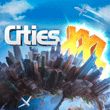Cities XXL: Trade
Wares and services
Each map has a certain predisposition to fulfill a specific role. It does not necessarily have to be a giant metropolis with skyscrapers soaring over the entire surface. It may be, for example, a combined group of villages encircled by vast fields and farms if it only can bring a fair income to the municipal coffers.
Your first contact with trade should take place after less than or about one hour when the factories or farms will start to produce excess goods. You can sell them in order to make up for the losses in the budget made by the development of the town.
As the village develops you will start to notice deficiencies manifested as negative number of tokens of a raw material. Soon there will be shortages of fuel and electric current. Don't worry about it as long as their availability isn't showed with the yellow marker. Its supplementation in the city is normal so build appropriate buildings such as power stations and oil wells.
And what if there are no suitable areas (in this case oil fields)? When commodity becomes difficult to obtain the only way is to buy it in Omnicorp or in one of other cities built earlier.
Omnicorp is this kind of vendors that you can sell everything and buy also everything but more expensive than it would normally be sold. As in life. It allows you to quickly increase the amount of available cash inflowing to your budget and you can trade with it even if you have a negative balance.
Trade with other cities is a bit more varied. At first you need to build those cities yourself and specialize the production of goods that you need. Then you can start the exchange of goods with them. These cities aren't controlled by anyone so if you are honest or not in any way in this exchange is up to you.
To be capable of trading with you, a city has to have a positive balance which means that the city itself (without trade) has to have a positive balance. Otherwise you will see a message that the export is not possible even when you want to engage in barter.
Services such as tourism, office services or waste treatment are also goods. You can trade it in the same way as other goods.
You trade goods in the form of so-called tokens. One token is a certain amount of surplus / shortage of goods. It is not predetermined, it is also practically impossible to determine how many buildings will be needed to produce a given amount. The produced amount depends on various factors: those obvious like the availability of raw materials but also less obvious such as the distance from the road or quality of life in the area in case of some institutions.
Omnicorp buys surplus in the form of such tokens, 40-50 cash tokens each - one token is 100 cash credits. In Resources, all your cash balances are also shown in tokens so you can quickly find out the state of your economy.
There are some restrictions to trade - every intercity road gives you the opportunity to exchange only 20 tokens. At the beginning that's a lot but after an intense development it is the number right for the export of one raw material. So build new roads, ports and airports which will increase the pool (although they are expensive to maintain).
To sum up, the trade will allow you to get rich quickly. There is no problem to get a couple of millions in your account in a couple of hours only by selling the surplus. Specialized cities can reach tens if not hundreds of thousands dollars of revenue per month!
You are not permitted to copy any image, text or info from this page. This site is not associated with and/or endorsed by the developers and the publishers. All logos and images are copyrighted by their respective owners.
Copyright © 2000 - 2025 Webedia Polska SA for gamepressure.com, unofficial game guides, walkthroughs, secrets, game tips, maps & strategies for top games.
